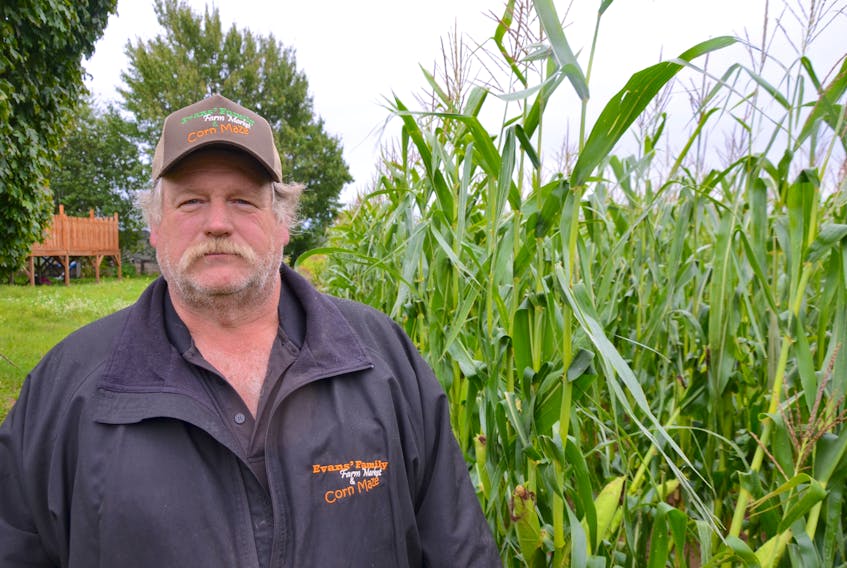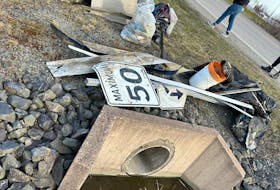WILMOT, N.S. — Terry Evans remembers the year he picked enough pumpkins to fill two tractor trailers for a contract with a major grocery chain. He went back the next day to load them for delivery, but all those hundreds of orange orbs had been stolen overnight.
The grocery giant even threatened to sue him for breach of contract.
But it gets better. Another year he cut an equal number of pumpkins off the vines ready to sell when heavy rains caused the Annapolis River to flood into the field and most of his pumpkins floated down to Annapolis Royal.
Wife Amy calls him the eternal optimist.
For the past 10 years Evans’ Family Farm has been the go-to place for a giant corn maze and Halloween fun on Highway 1 in Wilmot, but this year that’s not going to happen. And no, it’s not because post-tropical storm Dorian damaged his corn field. It didn’t. It’s because price of the special corn from the US doubled and maze design costs tripled. He’d be doing it at a loss.
“Insurance is crazy,” he said. “To pay $2,200 for liability insurance for two months for people to walk through a corn field, which isn’t a very dangerous thing, and to have it go from that to $4,800 in one year? I guess that was the straw that broke the camel’s back.”
In retrospect, the corn maze corn that grows 10 to 12 feet tall, would likely have been leveled by Dorian.

DORIAN
But he did plant corn. And Dorian did whip through his corn fields.
“I’ve got two fields that are pretty much a write-off,” he said. “It’s just if the wind could get at them from a different direction. I have one field that goes from Highway 101 right down through the No. 1 Highway, and it’s long and narrow and it’s just like a great big tunnel track and it looks like somebody went over it with a pavement roller. It’s flat. Just a total write-off.”
But it was only 15 acres, maybe 10 per cent of his corn acreage. “Ninety per cent of my cornfields look really, really good,” he said.
He’s just waiting to see if what survived will mature and harden or turn to mush. It’s been a tough year with a wet spring that saw him replant his sweet corn three times.
“Right now we’re waiting for my third planting to mature,” he said of the sweet corn. “I haven’t been able to get to the field to see it. It’s obstructed by flood waters from the Annapolis River right now. There’s a road that goes through and if the river backs up severely it fills a low area that we drive through to get to it.”
He’s got soy beans in and they’re looking really good. They’re taller than normal.
“It looks exceptionally good and it survived the hurricane well,” he said. “And I’ve got some oats, and normally oats are a bad crop to blow over in a hurricane. It’s amazing, the oats are pushed over a tiny bit, but it’s not laid flat. A lot of years you get a fall hurricane and it’ll be flat as a pancake.”
NO POWER
It’s Sept. 11. He’s sitting in his living room where the power is still out. He has a giant generator that was installed back in 1990 when he and father Lloyd raised hogs. His house is dark but the 300 horsepower Cummins diesel is running power to a rental property, the farm market store, and refrigeration storage facilities on the property. In its 29-year history it’s never had to run more than a few hours at a time. It’s costing $300 in diesel a day to run. He’s on Day 5. If it shut down he’d lose all his produce.
“There’s places up and down the community that have lost everything,” he said. A local meat shop lost it all. “It’s massive. All the restaurants. Grocery stores. Anyone up and down the community who doesn’t have a generator, by now the food in their refrigerators and freezers is done. You can get away with a day if you don’t open it much, but when you’re in to the fourth or fifth day?”
He was up well past midnight the night before getting winter wheat. He’s got the gear to deal with trees felled by Dorian and he’s been pricing jobs.
“It was worse than any storm in my lifetime,” Evans said. “The gentleman that I priced the trees for this morning, he told me – he’s 79, lived here his whole life – it was worse than any storm in his lifetime.”
He said there was a big difference with Dorian than any storm before.
“Normally we never get a north wind hurricane,” he said. “These trees that are all blown over – it doesn’t matter if it’s Margaretsville or Nictaux or the ones that we’ve done in Wilmot already – all the trees are severely rooted to the south and to the west. But on the north side of the trees they had very little roots. A tree grows over a hundred years, so whatever strength it needs for the norm, that’s where it grows roots. All these trees, the roots are on half the side of the tree.”

FARM MARKET
Evans had moved the farm market from the corn maze location back in the spring, hoping to position it tight up to his mother’s house so she could manage it by just going from the house to the shop when customers dropped by. He couldn’t get approval to do that and by the time he finally got the market open, most of the summer was gone.
“It’s frustrating,” he said. The move was less than 100 metres.
And then Dorian ripped the shingles off the market roof. A big trailer sits beside it, waiting for Evans to pull off the rest and re-shingle. But it’s raining now so he has to wait.
“Normally we do carrots, but I struggled this spring,” he said. “I had two heart attacks in May and a third one while I was in the hospital. I spent two and a half weeks in the hospital at the time that I should have been planting my carrots that we normally grow – for the deer hunters actually. It was too late by the time I got home. There’s a lot of things like that that we didn’t plant that we normally do.”
He’s 56.
He knows the local apple farmers got hit by Dorian worse than he did. He hasn’t been up the Stronach Mountain Road yet to look at that damage, but he’s heard the ground is red with drops.
It’s been a bad year, but Evans keeps working those 18-hour days.
“It’s been one of the worst for us,” he said.
It’s just after lunch time. Amy Evans arrives home. She has her own embroidery business.
“I’m always asking him why he keeps doing it year after year,” she said.
Terry Evans goes back to work.









